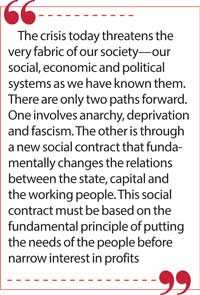Sunday Feb 15, 2026
Sunday Feb 15, 2026
Friday, 1 May 2020 00:00 - - {{hitsCtrl.values.hits}}

May Day 2020 is a deep moment of reckoning for working people. Propelled by the COVID-19 pandemic, workers are thrown out of jobs, livelihoods are lost, and economic survival, including  ensuring food security and sustaining essential services, is now an existential challenge. These tremendous social and economic vulnerabilities, now exposed by the pandemic, emerged over decades of systemic changes under a neoliberal global order of rampant accumulation through dispossession, rising inequalities, and the dismantling of social welfare. As capital, with the support of the state, increased its share of national income, the working people were pushed into survival through debt.
ensuring food security and sustaining essential services, is now an existential challenge. These tremendous social and economic vulnerabilities, now exposed by the pandemic, emerged over decades of systemic changes under a neoliberal global order of rampant accumulation through dispossession, rising inequalities, and the dismantling of social welfare. As capital, with the support of the state, increased its share of national income, the working people were pushed into survival through debt.
We are now facing the full consequences of the long capitalist downturn that emerged in the 1970s. The social contract that existed in the Western world after World War II, which constituted the social welfare state, was dismantled. The promise of postcolonial development in the developing world collapsed into neo-colonial extraction. Although capital accumulation, particularly for finance capital, continued through harsher forms of exploitation, dispossession and debt, the capitalist system has again reached a point of crisis where it cannot reproduce itself.
The crisis today threatens the very fabric of our society—our social, economic and political systems as we have known them. There are only two paths forward. One involves anarchy, deprivation and fascism. The other is through a new social contract that fundamentally changes the relations between the state, capital and the working people. This social contract must be based on the fundamental principle of putting the needs of the people before narrow interest in profits.
Global crisis: The fallout in Sri Lanka
The pandemic has exposed the world economy’s unsustainable foundations. While production and supplies have been disrupted by the pandemic, the collapse in demand to absorb future production is characteristic of the decades-long build-up of global debt and extreme inequality generated by financialisation.
In the case of Western countries, for indebted actors, from households to corporations, only dramatic Central Bank interventions are preventing the system from outright collapse. These include the  unprecedented scope of bond purchases by the US Federal Reserve, including corporate junk bonds, to ensure liquidity to companies, and the massive stimulus package seeking to create demand, which is in free fall. Even this strategy, however, is not sustainable, because it does not address structural issues. For example, the growing masses of people who are unemployed in the Western economies will not be able to purchase goods and services, causing an unprecedented collapse in consumer demand.
unprecedented scope of bond purchases by the US Federal Reserve, including corporate junk bonds, to ensure liquidity to companies, and the massive stimulus package seeking to create demand, which is in free fall. Even this strategy, however, is not sustainable, because it does not address structural issues. For example, the growing masses of people who are unemployed in the Western economies will not be able to purchase goods and services, causing an unprecedented collapse in consumer demand.
Global consumer demand worked in conjunction with export-led growth models in places such as Japan after World War II, and then economies like Korea, Malaysia and Thailand, and then later in China. For countries such as Sri Lanka, which in recent years have been pursuing export-led growth, the model is collapsing before their eyes. Western consumer demand is declining dramatically. The pandemic may have triggered the current crisis, but the reality is that Western household debt had become unsustainable well before, as evidenced by the 2008 Global Economic Crisis.
In the 1990s, the heyday of hyper-globalisation, global trade growth was three times global economic growth. But that steadily declined in the 2000s. After the 2008 Crisis, global trade growth has been lower than global economic growth. The IMF’s World Economic Outlook for 2020 (First Chapter launched in April and the rest to follow in May 2020), expects global economic growth in 2020 of -3% and global trade growth of -11%. That is to say, the global economy will shrink by 3% and global trade growth will shrink by three to four times’ global economic growth. That is the most damning reality for the export-led growth model, which was promoted by the neoliberal establishment, including the IMF, just months ago.
Therefore, can local factories continue to produce the commodities necessary for local consumption? Can agricultural expansion produce the food needs of society following restrictions on imports? Consequently, can workers reproduce themselves by obtaining the income to purchase essential goods for their households, and thus create much-needed demand in the economy? Can households – particularly women who face a double economic burden outside and inside the home – provision food and reproduce the hidden household economy?
Labour, capital, and the State
As the current crisis unfolds, we must draw relevant lessons from historical periods of social, economic, and political crisis. The most obvious example is the Great Depression of the 1930s.
In the 1940s, the Hungarian social scientist Karl Polanyi argued that the Great Depression destroyed the myth of a self-regulating market, which had undermined and destabilised society.
The market-driven process drove labour - meaning, workers and those who otherwise depended on income from work - to the edge of survival, if not starvation.
The choice was between a fascist, state socialist, or social democratic solution to the problem of social reproduction. The latter two triumphed over the former during the course of World War II.
In the aftermath of World War II, in many Western countries, the welfare state epitomized by US President Franklin Delano Roosevelt’s New Deal, became the basis for a social contract for capitalism under liberal democratic governments; a compromise ensured by the state between capital and labour. This contract lasted until the crisis of capitalism in the 1970s, when the myth of the self-regulating market re-emerged. Neoliberal proponents claimed that the market should decide the way in which wealth is distributed, even though the market is constructed and regulated in the interest of capital by the state. The class project of neoliberalism has embodied this market fundamentalism.
When Sri Lanka previously depended on exports to Western countries, it could in the interest of its businesses impose harsh demands on workers, including suppressing their wages, because Western consumers would buy the goods and services. Now, however, with Western consumer demand rapidly shrinking, Sri Lanka is forced into a situation where its working people in Sri Lanka must be able to buy the goods and services they produce in the country. Otherwise, the system itself will break down.
That means working people need higher wages and we must take essential services out of the market by providing them for “free” through the state by redistributing wealth, thereby creating the necessary demand that markets, whether national or external, will not provide.
A new social contract can only emerge by grasping the consequences of the global crisis for Sri Lanka. We have parallels in our own history, such as the establishment of free education and healthcare after the Great Depression of the 1930s and the disruption of World War II. These institutions became Sri Lanka’s pride of social progress. Even in the current pandemic, we have much to thank for the foresight of our free education and healthcare visionaries.
A new social contract is not about tweaking economic policies and expanding sectors to create demand. It will entail fundamental changes in our social relations, including how and what we produce, distribute, and consume. It will require holding the state accountable to ensure the rebalancing of dramatically unequal relations between capital and labour. Such radical change to our economy would mean putting the wellbeing and interests of people before that of growth and profits.
For example, it should mean food subsidies or a universal basic income to ensure the sustenance of life, free transport for people to realise their freedom of movement, and ensuring that working people involved in agriculture and fisheries have the capacity to determine policies that affect those sectors. We must assert the potential of this new political economic programme as the people’s right, which can only be won through collective action, in the course of democratic struggle.
Devaka Gunawardena is an independent researcher who holds a PhD from the University of California, Los Angeles and Ahilan Kadirgamar is a Senior Lecturer, University of Jaffna.